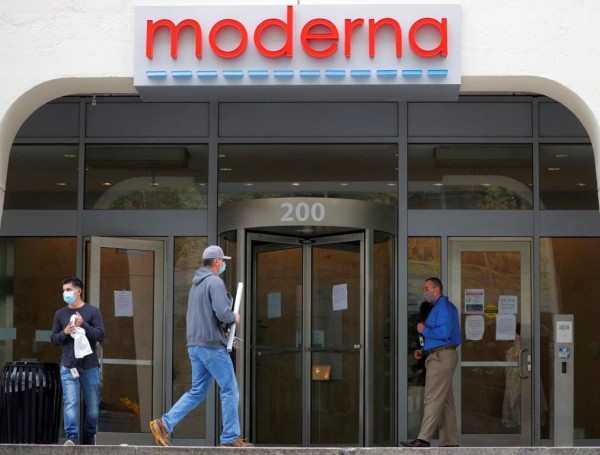This COVID-19 Vaccine Has Been Effective on Every Volunteer, Says Moderna

A sign marks the headquarters of Moderna, Inc., which is developing a vaccine against the coronavirus, in Cambridge, Massachusetts, US.
Recent reports came out stating that the first COVID-19 vaccines could be available this fall for emergency use should everything continue to go smoothly as it has been.
Some candidates have presented their capability to induce the preferred immune reaction in volunteers. Meaning, the said candidates can already develop "neutralizing antibodies, binding to the spike protein of the virus and stop it from spreading infection in human cells.
So far, the data released presents that COVID-19 vaccines do not present side effects, which are quite excellent news in this battle to look for a preventive drug for the pandemic.
ALSO READ: Are Vaccine Makers Facing the Biggest Challenge in the History of Medical Manufacturing?
Ready to Share Results
Moderna, the firm that has been at the forefront of the development of a vaccine for COVID-19, announced its Phase 1 study results, disclosing that each of the volunteers who were administered with the vaccine showed the expected immune reaction: "the neutralizing antibodies."
The company, a manufacturer of the vaccine candidate, mRNA-1273, revealed a couple of weeks back, partial results from its research, and had to bear with the "just criticism" for the way it opted to share the data publicly.
Looking back, even Dr. Anthony Fauci reportedly criticized the announcement of Moderna also though its vaccine candidate is a joint initiative within the firm and the National Institute of Allergy and Infectious Disease (NIAID), which he heads.
Despite the criticism, Modern said is it ready to properly share results through a study a renowned medical journal recently published.
Aside from publicly sharing data, the company also said it is expanding its test to older individuals, on top of its plan to begin with its Phase 3 trial this month, on tens of thousands of volunteers.
The Vaccine
Moderna claimed, "The mRNA-1273 vaccine-induced binding antibodies to the full-length COVID-19 Spike proteins" in all participants for 15 days after their initial dose of vaccination.
As a result, there was an increase in the neutralizing antibodies following the second vaccine in all three groups of participants. On the 57th day, well after the next or second dose of vaccine, volunteers were found to have more antibodies in their bloodstream compared to the samples taken from the patients who recovered from the infectious disease.
The group of recovered patients included those who experienced severe COVID-19 symptoms that required hospital confinement and ventilation. It also included people who suffered moderate and mild symptoms.
According to Dr. Lisa Jackson, from Kaiser Permanente Washington Research Institute, this development "is an essential building block needed to move forward with the tests" that could really identify if the vaccine could be considered as protection from contagion.
Other than the antibodies, scientists emphasized "T cell immune reactions at dose levels of 25 µg and 100 µg." The company said it would continue examining the volunteers in their Phase 1 study for one year after their second dose of vaccine to evaluate the immune response's longevity.
DON'T MISS THIS: COVID-19 Vaccine: How Soon Can We Expect It?
3-Phased Tests
Moderna registered seven more cohorts in the Phase 1 test to monitor additional doses, not to mention, mRNA-1273's effect on older individuals.
In connection to this, a 50 µg dose will be examined in individuals aged 18 to 55 years, the same age range observed for the other three treatments. Meanwhile, participants aged older than 55 years would also be part of different clinical tests for Phase 1.
Moderna also said it signed up 600 participants in Phase 2 trials split into two age ranges, specifically those aged 15 to 55, and those who are more than 55 years of age.
As for what the pharmaceutical firm described as the "randomized placebo-controlled Phase 3 trial," its slated onset is July 27 and will comprise 30,000 volunteers at a dose level of 100 µg.
In a press release, the company said its primary objective is to prevent the "symptomatic COVID-19" infection. Other goals include the avoidance of severe infectious disease, as well as the prevention of contagion with the said illness.
IN CASE YOU MISSED THIS: How Effective Are COVID-19 Antibody Tests?
Jul 16, 2020 08:00 AM EDT





